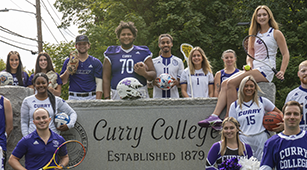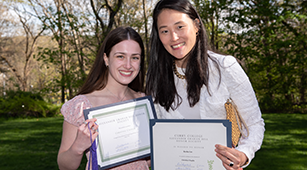Schedule an appointment to meet with Career & Experiential Learning about your area of interest.
Make an AppointmentContact the Counseling Center
- 617-333-2182
- counselingcenter@curry.edu
- Wellness Center, 3rd floor
Changing times: Things to remember as your child transitions to college
College is a time of transition and change, one that is unique, exciting and full of possibilities. It is also a time when many students are living away from home for the first time, assuming greater personal and/or financial responsibility for themselves and well-being. It is common for students to experience some “growing pains” associated with changing routines, expectations and distance from the lives they lived prior to entering college, or living away from home, not to mention their loved ones. Add to this, college schedules are often typically less tightly structured than those at most high schools. As a result, students are faced with finding new ways to manage their time, including completion of academic coursework, self-care and even, recreation. During this process, students are also developing new peer groups, interests, academic areas of focus and new life skills. While exciting, it may seem overwhelming to students, though this is often temporary as they adjust to being in college.
Be there.
Be available to your child. Although this is a time when young people develop their independence, it is important for them to know that you are there if and when they need you. You may find that your child wants a different level of contact than what you would prefer. Also, your child’s need for your support may change significantly over time. One week you may get constant calls and emails, the next week you may not hear a thing. This is normal, and while it can be unsettling for parents, it is a sign that your child is exploring different aspects of developing independence.
It can be hard to know what kind of support to give from a distance. When children are in distress, parents often have the urge to rush to their side as when there was a skinned knee at the playground. Some parents feel that children need to be tough and start facing life as adults. Whatever your impulse, accept it and take time to think about what would be best for your child at this point. Generally, it helps to provide a mix of support as well as recognition that your student is entering a new phase of life and is learning how to accept responsibility as an independent person. That said, being independent could also entail asking for, and receiving, help when needed.
There are many on-campus resources available to Curry College students. Academic Success, Academic Advising, the Office of the Dean of Student Services, Residence Life & Housing, Public Safety as well as the Counseling Center and Health Center are just some of the services that are available on campus to assist your student with a variety of concerns.
The college years can be difficult as well as fun and rewarding. Academic stress, relationship issues, homesickness, and making mistakes are all a part of the experience of being in college and becoming an adult. It is important for your child to know that you understand that hard times are a part of life and that you want to help when times are tough. Explain that you know that your child will get through difficult times and that you will be there to provide support no matter how he/she/they are feeling. In addition, it can also be helpful to normalize that some stress is a normal part of life, whether it is performance anxiety with academics, meeting new friends, or adjusting to having a roommate for the first time.
It is helpful for students to know what your expectations are, particularly regarding financial matters. Will they be expected to pay for books and fees? Will they need to earn their own spending money? Engaging in open communication and being specific before your child leaves for college will help to avoid misunderstandings later.
Through high school, it is common for many students to look to their parents to help them navigate a variety of issues and services. As your student transitions to college, they will be expected to engage such services independently, particularly once they are 18 years of age and older. For some students and parents, this transition may feel easy and natural. For others, this may feel challenging and students will gain increasing skill, confidence and motivation to engage campus resources independently over time. As your student enrolls and matriculates at Curry, it may be helpful to have conversations in advance about how they will need to assume increasingly independent roles in seeking out assistance of all kinds (e.g., academic support, housing questions, health, as well as scheduling appointments with the Counseling Center). For parents, knowing and anticipating that expectations may be different can help your child adapt to this new phase of life.
Remember that you may feel a variety of different emotions in relation to your child’s college career: ambivalence, concern, anxiety, hopefulness, and excitement, just to name a few. Acknowledging and accepting your own feelings is a great way to model healthy adult behavior for your child and also helps you to maintain an even keel. Seek support when you need it, from family, friends, and others. Many parents use the time when their child attends college as a transition to focus on other interests that they have but may not have had time to indulge while they raised children.
The Counseling Center is a confidential resource for students to discuss personal, emotional and other issues of concern, and operates on a short-term model of care. This means that appointments are typically biweekly and length of treatment is often about 6 to 8 sessions per academic year. Treatment is intended to be solution focused, exploring how to assist and empower students to develop effective and healthful stress management and problem solving strategies. At times, students may require services that are beyond the scope of what our department can provide. In these situations, the Counseling Center will work with your student to identify appropriate off campus referrals to help them obtain the most effective care possible.
Additionally, currently enrolled students may access a curated list of community based mental health providers through The Shrink Space. By logging on with their Curry email they will access unique resources to connect with a wide range of therapists.
There are occasions when your student’s behavior or presentation may raise concern for you. The Counseling Center staff is available for consultation. These often focus on a range of issues, including: how to assist a student faced with a difficult situation, how to refer a student to the Counseling Center, and/or how to locate appropriate local mental health treatment for students if needs are beyond the scope of what the Counseling Center can offer. Additionally, consultation may include discussion about other possible campus supports and services that may be of use to your student (e.g., academic, social, or in regards to campus living). Please contact our staff by calling 617-333-2182 and ask to speak with a clinician. We will be glad to talk with you. In the process, we will typically encourage parents to be open with their students about consulting with us, particularly when you have a specific concern. In the event of a mental health emergency after hours, students may consult with our Counselor on Call when the Counseling Center is closed. This is for emergency purposes only and our staff may be paged by calling Public Safety at 617-333-2222.
The Counseling Center is available for confidential short-term counseling and crisis intervention to Curry College students. If you are concerned about your student please encourage them to contact us directly to consult, and/or to schedule an appointment with the Counseling Center. We may be reached by calling 617-333-2182. We are open Monday through Friday, 8:30 a.m. to 4:30 p.m., during the academic year, with some evenings by appointment. Students may visit the Department by coming to the Wellness Center, 1016 Brush Hill Road, second floor Reception on the main (Milton) campus, near the Student Center and Admissions.
Additional resources include:
The Mind Spa, our relaxation room, offers students the ability to receive individual instruction to use the massage chair, light therapy lamp and biofeedback and other symptom tracking software. Following an initial orientation to the Mind Spa, students may schedule self-guided use of the room to reduce stress, reflect, and use this quiet space to calm themselves. There is no fee for this service.
24/7 Counselor On Call: 617-333-2908 - This is a emotional and mental health support line students may use of immediate emotional support when school is in session. Curry College Counselors provide back up on call services to this support line.
**If you believe your student is in IMMINENT danger to harm self or other due to a mental health emergency, please contact Public Safety at 617-333-2222 or 911 for an off campus emergency.
If your student is currently working with a therapy and/or medication provider off campus for their mental health needs, we advise you to talk with your student about steps they will take to maintain existing treatment relationships, and/or obtain new providers. It is very important to make plans in advance of your student’s arrival on campus about how they will plan for continuation of services before coming to campus and to avoid extended wait times for first appointments. This is particularly important since medication services are not currently available within the Counseling Center. For continuity of treatment, our recommendation is to arrange periodic meetings with the provider in the home community, which often occur during semester breaks, weekends home or as needed. For medication storage, we encourage students to also make plans about how they will store any medications they take, so as to avoid inadvertent loss.





